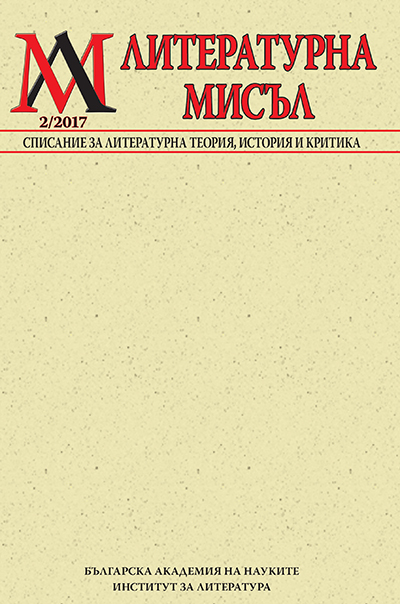„Неавтентичният човек” или за внезапните симетрии в идеологическото писане на Цветан Стоянов
The "Unauthentic Man" or the Unexpected Symmetry in the Ideological Writing of Tsvetan Stoyanov
Author(s): Bisera DakovaSubject(s): Politics / Political Sciences, Language and Literature Studies, Cultural history, Studies of Literature, History of ideas
Published by: Институт за литература - БАН
Keywords: ideology;alienation;West;Philistine;„shaggy communism“
Summary/Abstract: The analysis attempts to recreate the ideological parallel – on the basis of the genetic cohesiveness between two texts (novel “Nad tvoya dom spokojstvie” [Calmness over your home)] – 1962; 1967) and the essayist tract "Nishkite, koito se prekzsvat” [The Strands That Interrupt] – 1967. The ideology here is thought not as narrowly political as a limited doctrinaire, but by the model of Karl Mannheim – as a way of giving the world a total view, to build apart, contrasting, vivid images of reality. In this sense, ideology is valued for its creative potential: through its overwhelming prospect, the great narrative of alienation has been built, a socio-cultural phenomenon is seen in its historical continuity, the fraudulent similarity of its manifestations, its misleading unity.By means of ideological prejudices, the image of the West – the true event, the scene of evil, the place that has refused the same dialogue – was outlined and subsequently refilled. The West of Tsvetan Stoyanov is long-lived to be ideologically rejected. It is a place of premonition differences, but also of spontaneous, suddenly noticed similarities. Within its limits and vision of comfort, settling and affection to home is also seen, where the figure of the philistine, is the basis of the ideological writing of Svoyanov. The Philistine is a figure that collects epochs, infinite in its incarnations; it is the bearer of the author's incoherent idea of organic, warmth and fullness of being. This anathematic vision consistently undermines the grounds for an ideological description of the world.In the thinking of the remarkable Bulgarian erudite, the two obligatory poles are emerging – the food-saturated West and the ascetically-scattered, “shaggy communism” of the Red Guards in China. The unexpected, but clearly visible, image of the slightly outspoken socialist society, whose utopian horizon has not yet been revoked, emerges unexpectedly among them.
Journal: Литературна мисъл
- Issue Year: LX/2017
- Issue No: 2
- Page Range: 56-67
- Page Count: 12
- Language: Bulgarian
- Content File-PDF

